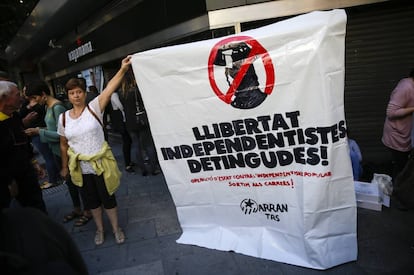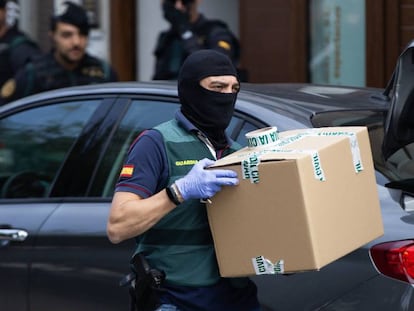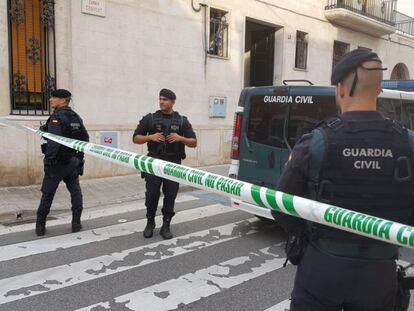Judge accuses Catalan separatists of belonging to new terrorist group
Seven individuals have been placed in pre-trial detention without bail for their alleged involvement in a faction of a pro-independence organization that seeks secession through violent means

Seven of the nine Catalan separatists arrested on Monday on suspicion of planning acts of violence have been placed in pre-trial custody without bail. Judge Manuel García-Castellón, of Spain’s High Court, the Audiencia Nacional, made the decision on Thursday, arguing that the individuals belonged to a violent faction of the Committees to Defend the Republic (CDR), a network of grassroots activists who have made headlines in recent years through public acts of protest in support of the Catalan independence movement.
The seven detainees are facing charges of belonging to a terrorist group, possession of explosives and conspiracy to cause harm
In his writ, García-Castellón described this faction, dubbed the Technical Response Team (ERT), as an “organization with a hierarchical structure, that aims to instate a Catalan republic via any means, even violent ones,” according to judicial sources. “The ERT is an organization with sufficient capacity to carry out tactics and operations with a high level of professionalism,” the court statement read.
The seven detainees are facing charges of belonging to a terrorist group, possession of explosives and conspiracy to cause harm. This is perhaps the most serious ruling to be made against Catalan separatists since several pro-independence political and social leaders were arrested in 2017 for their involvement in actions leading up to the illegal independence referendum on October 1 of that same year, and the unilateral declaration of independence that was passed a few weeks later.
The judge’s decision comes as part of an investigation, launched by an investigating judge at Spain’s High Court, into radical Catalan separatists who were allegedly planning acts of violence ahead of the second anniversary of the unauthorized independence referendum, and the Supreme Court’s widely anticipated decision on the fate of Catalan separatist leaders who were tried earlier this year for rebellion, sedition and misuse of public funds in connection with the unilateral secession attempt of 2017.
Officers discovered documents explaining the components needed to make homemade explosives
As part of the investigation, Civil Guard officers raided homes and commercial premises on Monday in the cities of Barcelona, Sabadell and Santa Perpètua de Mogoda, in an operation dubbed “Operation Judas.” The swoop led to the arrest of nine people and the seizure of various materials that can be used to make explosives.
In Sabadell, Civil Guard officers found sulfuric acid, paraffin, aluminum powder, industrial paint stripper, gasoline and thermite, a pyrotechnic composition with great incendiary power. Officers also discovered documents explaining the components needed to make homemade explosives as well as Goma-2, a powerful industrial explosive that was regularly used by Basque terror group ETA in the 1980s and 1990s. Goma-2 cannot, however, be made with the materials seized. Two of the individuals arrested on Monday have confessed to making explosives and testing them, according to sources from the investigation. They were also found to have images of regional police stations and patrols on their cellphones.
English version by Melissa Kitson.
Tu suscripción se está usando en otro dispositivo
¿Quieres añadir otro usuario a tu suscripción?
Si continúas leyendo en este dispositivo, no se podrá leer en el otro.
FlechaTu suscripción se está usando en otro dispositivo y solo puedes acceder a EL PAÍS desde un dispositivo a la vez.
Si quieres compartir tu cuenta, cambia tu suscripción a la modalidad Premium, así podrás añadir otro usuario. Cada uno accederá con su propia cuenta de email, lo que os permitirá personalizar vuestra experiencia en EL PAÍS.
En el caso de no saber quién está usando tu cuenta, te recomendamos cambiar tu contraseña aquí.
Si decides continuar compartiendo tu cuenta, este mensaje se mostrará en tu dispositivo y en el de la otra persona que está usando tu cuenta de forma indefinida, afectando a tu experiencia de lectura. Puedes consultar aquí los términos y condiciones de la suscripción digital.










































